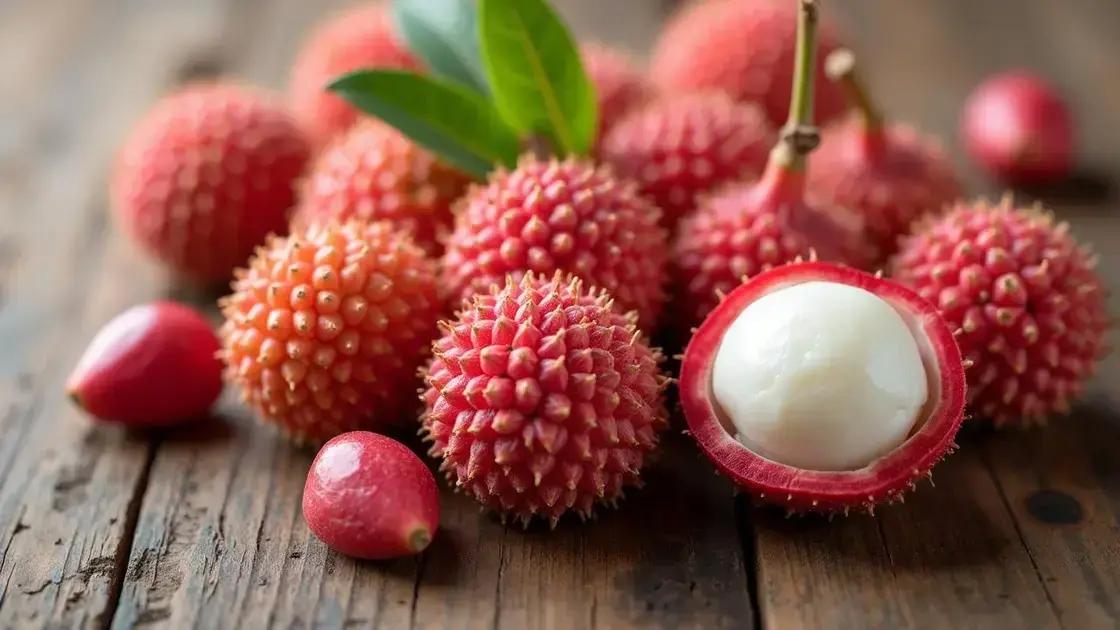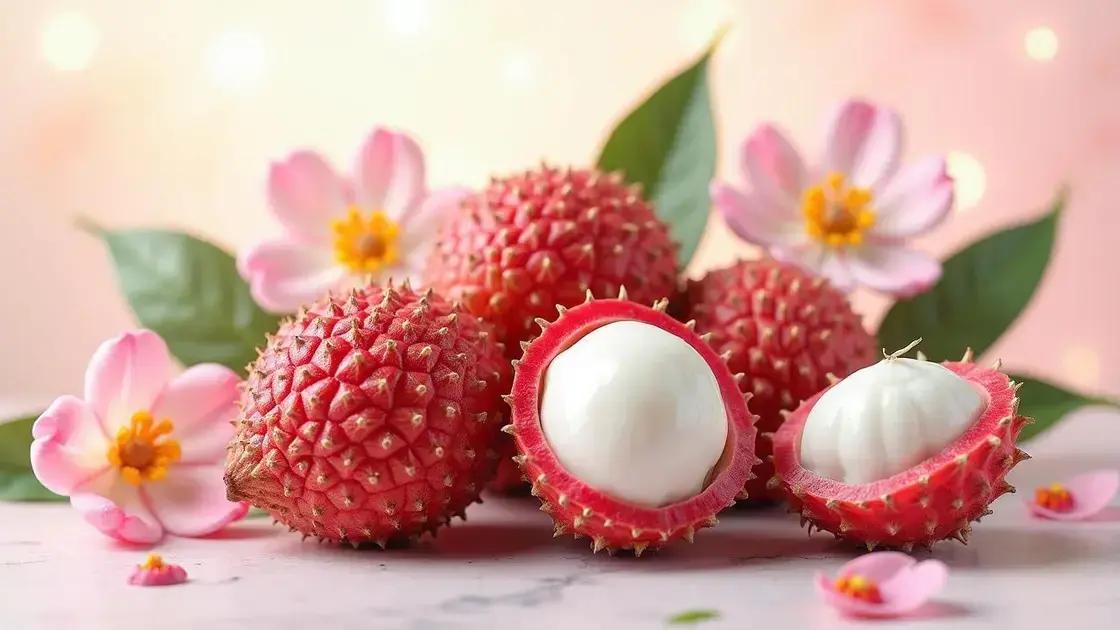Lychee is a tropical fruit that reduces stress and supports hormonal balance through its rich content of vitamin C and antioxidants, while also providing essential nutrients. Incorporating lychee into your diet is easy, whether eaten fresh, blended into smoothies, or included in various dishes. This fruit offers numerous health benefits, including improved mood and immune support.
Are you searching for natural ways to enhance your well-being? Discovering how lychee reduces stress and supports hormonal balance might be your answer. This exotic fruit is not just delicious; it offers numerous health benefits that can help calm your mind and regulate your hormones. In this article, we will delve into the science behind lychee’s stress-relieving properties and its vital role in maintaining hormonal equilibrium. Let’s explore how incorporating this fruit into your daily routine can improve your overall wellness.
What is Lychee and Its Benefits?

Lychee is a tropical fruit native to southern China. It has a unique, sweet flavor and a deliciously fragrant aroma. The fruit is small, round, and has a rough, pink-red skin, making it instantly recognizable. People often enjoy lychee fresh, but it is also used in juices, desserts, and various dishes.
Benefits of Lychee
Lychee is not just tasty; it offers a range of health benefits as well. Here are some of the most significant advantages:
- Rich in Antioxidants: Lychee contains antioxidants like vitamin C and flavonoids, which help fight free radicals in the body. This can reduce oxidative stress and promote overall health.
- Supports Heart Health: The nutrients found in lychee can help improve circulation and lower blood pressure, supporting cardiovascular health.
- Boosts Immune System: With high levels of vitamin C, lychee can strengthen the immune system, helping the body fend off illnesses.
- Improves Skin Health: The antioxidants in lychee can also benefit your skin, reducing the appearance of wrinkles and promoting a youthful glow.
- Aids Digestion: Lychee contains dietary fiber, which is essential for healthy digestion and can help prevent constipation.
These benefits make lychee a fantastic addition to a balanced diet. Not only does it taste great, but it also contributes positively to your health, particularly in areas such as stress reduction and hormonal balance.
How Lychee Reduces Stress

Lychee is known for its unique flavor, but it also plays a significant role in reducing stress. This tropical fruit is rich in natural compounds that help promote a sense of calm and relaxation. One of the key components in lychee is vitamin C, which can help lower levels of stress hormones in the body.
How Lychee Affects Stress Hormones
When under stress, the body releases hormones such as cortisol. High levels of cortisol can lead to feelings of anxiety and tension. Studies suggest that the antioxidants found in lychee can help lower cortisol levels, thus reducing overall stress. By incorporating lychee into your diet, you may help your body better manage stress.
Natural Mood Enhancers
In addition to its physical benefits, lychee has mood-boosting properties. The sweet taste and aroma of lychee can stimulate the production of serotonin, often referred to as the ‘feel-good’ hormone. Higher serotonin levels can lead to improved mood and decreased feelings of stress. Eating lychee or drinking its juice can serve as a natural remedy for stress relief.
Hydration and Well-Being
Staying hydrated is essential for managing stress, and lychee is composed of about 82% water. Consuming fruits that are high in water content can help keep you hydrated, improve energy levels, and enhance overall well-being. When your body is well-hydrated, you’re less likely to feel stressed or anxious.
Incorporating Lychee for Stress Relief
Including lychee in your daily meals or snacks can help you take advantage of its stress-reducing properties. You can enjoy lychee fresh, blended into smoothies, or even added to salads. This versatile fruit not only satisfies your sweet tooth but can also assist in calming your mind.
The Role of Lychee in Hormonal Balance

Lychee plays an essential role in supporting hormonal balance in the body. This tropical fruit is packed with vitamins and minerals that help maintain healthy hormone levels. One of its key benefits is its high content of Vitamin C, which helps regulate the production of hormones such as cortisol and adrenaline.
Hormones and Their Functions
Hormones are chemical messengers that influence various body functions, including mood, metabolism, and stress levels. When these hormones are out of balance, it can lead to various health issues. Lychee can help support a balanced hormonal environment, which is vital for overall well-being.
Antioxidants and Hormonal Health
Lychee is rich in antioxidants, such as flavonoids, which are known to combat oxidative stress. Oxidative stress can negatively affect hormone production. By consuming lychee, you can help protect your hormonal systems and improve their functionality.
Fighting Inflammation
Another benefit of lychee is its potential to reduce inflammation in the body. Chronic inflammation can disrupt hormone levels and lead to conditions like hormonal imbalance. The anti-inflammatory properties of lychee can be beneficial for maintaining a healthy hormonal balance.
Supporting Reproductive Health
Lychee can also support reproductive health in both men and women. It is believed that the nutrients in lychee can enhance fertility and regulate menstrual cycles. Incorporating lychee into your diet may provide beneficial effects for those looking to achieve hormonal balance.
Nutritional Profile of Lychee

The nutritional profile of lychee makes it a fantastic fruit for promoting health and well-being. Lychee is low in calories but rich in essential nutrients, adding great value to your diet.
Key Nutrients in Lychee
Here are some important nutrients found in lychee:
- Calories: Lychee is low-calorie, providing around 66 calories per 100 grams, making it a great snack option.
- Vitamin C: A single serving of lychee offers more than 100% of the daily recommended intake of Vitamin C, which is essential for immune function and skin health.
- Vitamin B6: Lychee contains Vitamin B6, which helps with brain health and the production of neurotransmitters that regulate mood.
- Copper: This fruit is rich in copper, which supports red blood cell production and boosts energy levels.
- Potassium: Lychee provides potassium, which is vital for heart health and proper muscle function.
Hydration and Fiber
Lychee also has a high water content of about 82%, making it hydrating, especially in hot weather. Additionally, it contains dietary fiber, which aids digestion and promotes a healthy gut.
Antioxidants and Other Benefits
Beyond vitamins and minerals, lychee is packed with antioxidants, including flavonoids and polyphenols, which provide anti-inflammatory and anti-cancer properties. These antioxidants help protect your body from oxidative stress and may improve your overall health.
Ways to Incorporate Lychee into Your Diet

Incorporating lychee into your diet is easy and delicious. Here are some simple ways to enjoy this tropical fruit:
Fresh Snacks
Eating lychee fresh is one of the best ways to experience its sweet and juicy flavor. Simply peel the skin and enjoy the succulent fruit as a snack. It’s perfect for on-the-go munching!
Lychee Smoothies
Blend lychee with yogurt, milk, or a dairy-free alternative to create a refreshing smoothie. You can add other fruits like bananas or strawberries for added flavor and nutrients.
Fruit Salads
Add lychee to your fruit salads for an extra burst of sweetness. Combine it with other fruits like watermelon, kiwi, and berries to create a colorful and nutritious dish.
Lychee Desserts
Lychee can be used in various desserts, such as puddings, ice creams, or sorbets. Combine it with coconut milk for a tropical twist in your sweet treats.
Lychee Juice or Cocktails
You can enjoy lychee juice on its own or use it in cocktails for a unique flavor. Mix it with other juices or spirits to create refreshing beverages perfect for warm weather.
Cooking with Lychee
Lychee can also be incorporated into savory dishes. It pairs well with chicken, shrimp, or salads, adding a sweet and fruity flavor that enhances the overall taste.
These various ways to incorporate lychee into your diet make it easy to enjoy its many health benefits while tantalizing your taste buds.
How Lychee Benefits Your Well-being
In conclusion, lychee is a delightful fruit that not only tantalizes your taste buds but also offers impressive health benefits. By reducing stress, supporting hormonal balance, and providing essential nutrients, lychee can play a significant role in your overall wellness.
Incorporating lychee into your diet is easy and versatile, whether you enjoy it fresh, in smoothies, or in tasty desserts. With its high vitamin C content and antioxidants, lychee is a fruit that can help strengthen your immune system and combat oxidative stress.
Embrace the many ways to enjoy lychee, and explore its benefits of enhancing both your physical and mental health.
FAQ – Frequently Asked Questions about Lychee and Its Benefits
What are the health benefits of lychee?
Lychee is rich in vitamin C and antioxidants, which help boost immunity, reduce stress, and support hormonal balance.
How can I incorporate lychee into my diet?
You can enjoy lychee fresh, include it in smoothies, fruit salads, desserts, or even use it in savory dishes.
Is lychee good for stress relief?
Yes, lychee can help lower cortisol levels and improve mood by stimulating serotonin production.
What nutrients does lychee provide?
Lychee is low in calories and high in vitamin C, vitamin B6, copper, and potassium, contributing to overall health.
Can lychee help with hormonal balance?
Yes, lychee contains compounds that help regulate hormones, benefiting reproductive health and mood stability.
How many calories are in lychee?
Lychee has approximately 66 calories per 100 grams, making it a low-calorie, nutrient-rich snack.













